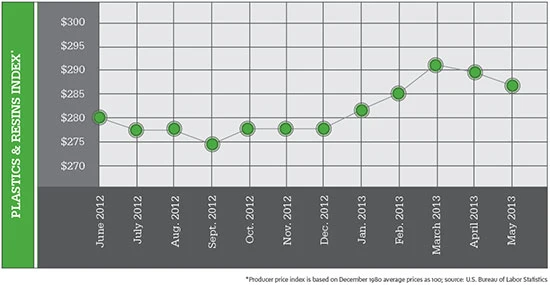
The U.S. market is not the only one feeling the effects of the Operation Green Fence. While processors in Europe appear to have little trouble finding markets for high-end grades of plastic scrap throughout Western Europe and report stable pricing for some material, lower-grade material offers another story.
The well-documented tightening of plastic scrap shipments to China in light of material quality concerns is shutting off the flow of a significant amount of plastic scrap from throughout Europe. Recyclers say they are reluctant to ship low-value plastic scrap to China because the cost of a rejection could outweigh their profit margin.
Chinese officials have indicated that Operation Green Fence will run through November 2013. However, a recent “ISRI Leadership Update” offers recyclers hope that China may dismantle its green fence earlier than November. In the update, Robin Weiner, president of the Institute of Scrap Recycling Industries Inc. (ISRI), writes that some of the problems recyclers in the U.S. and Europe are experiencing may have less to do with inspection issues and more to do with import licensing.
.jpg) |
She writes in the “ISRI Leadership Update” dated June 11, 2013, that “some of the problems that exporters of scrap plastics, in particular, are having may have nothing to do with rules dealing with exporters to China (inspection issues, etc.) but rather an attempt by the Chinese government to enforce their import (versus export) licensing requirements.”
Weiner continues, “It seems that some of the mixed plastic going into China was being purchased by importers with improperly issued licenses. Additionally, some importers who were appropriately licensed were illegally auctioning the plastics they imported to unlicensed recyclers. It appears the Chinese government thought that cracking down on the imported materials would be an effective way to deal with all three issues.”
Weiner says that during their travels in China this spring, ISRI staff have learned from several government officials that the initial level of enforcement may lessen “significantly” if not conclude well before Nov. 30. “And several industry members from both the U.S. and Europe confirmed to us that from their standpoint it appears that CIQ (Entry-Exit Inspection and Quarantine Bureau) is relaxing the enforcement level, except for those who have had a history of shipping problematic loads,” she adds.

Explore the July 2013 Issue
Check out more from this issue and find your next story to read.
Latest from Recycling Today
- Aqua Metals secures $1.5M loan, reports operational strides
- AF&PA urges veto of NY bill
- Aluminum Association includes recycling among 2025 policy priorities
- AISI applauds waterways spending bill
- Lux Research questions hydrogen’s transportation role
- Sonoco selling thermoformed, flexible packaging business to Toppan for $1.8B
- ReMA offers Superfund informational reports
- Hyster-Yale commits to US production





